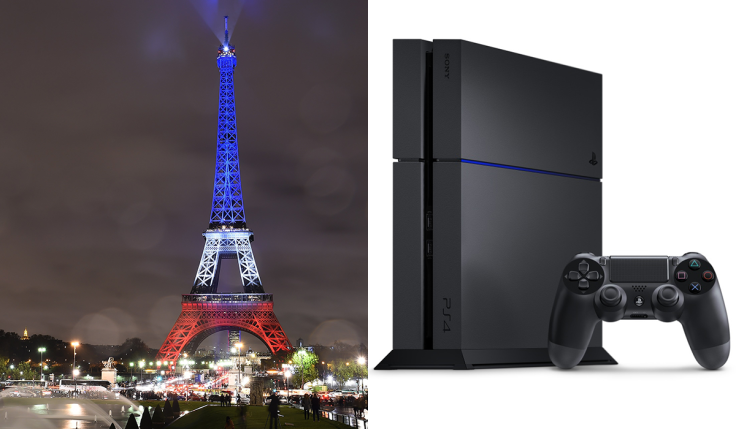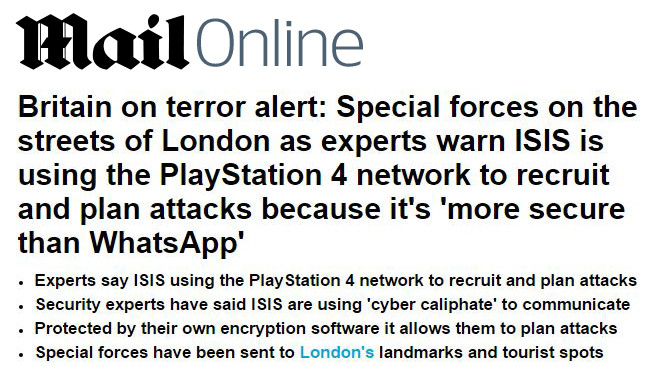PS4 and Isis: Why mainstream media eagerly demonised video games in wake of the Paris attacks

Speaking three days before the attacks in Paris on 13 November, Belgium's Home Affairs Minister Jan Jambon said he was worried that terrorists could use the PlayStation 4 to elude security forces and communicate, since it was "even more difficult to keep track of than WhatsApp."
After the attacks, Forbes (incorrectly) reported that French police had discovered a PlayStation 4 console whilst raiding the terrorists' homes, tying the story to Jambon's remarks. Forbes also claimed that, as well as the PS4's online chat functionality, terrorists could use various video game features and contrivances to speak to one another.
"An Isis agent could spell out an attack plan in Super Mario Maker's coins and share it privately with a friend, or two Call of Duty players could write messages to each other on a wall in a disappearing spray of bullets," wrote Forbes contributor Paul Tassi.
The Forbes article has since been corrected and now states that, despite initial reporting, no confirmation was received from French police that a PS4 had been discovered during its raids. Forbes has also amended the article to downplay the connection between Jambon's remarks and the Paris attacks: "Minister Jambon was speaking about tactics he knows Isis to be using generally," the correction reads.
Nevertheless, The Daily Mail, The Mirror, The Telegraph and The Express have all reported that the Paris attackers may have used the PlayStation 4 as a means to communicate. The Mail opens its article with "Isis is using the PlayStation 4 network to recruit and plan attacks because it is 'more secure than WhatsApp,' intelligence experts warn." The Express has subtitled its report: "Isis terrorists used the online chat facility in the Sony PlayStation 4 to plot the Paris attacks, the Belgian Minister of Home Affairs has claimed."

There's some mitigating language throughout all of these articles, and I'm sure the editors have taken care to ensure they could never be accused of direct fabrication, but they each heavily imply that either Jan Jambon stated, as a fact, the PlayStation Network was used to co-ordinate the Paris attacks, or that the Paris attacks were co-ordinated via a PS4. The former is false; the latter unproven.
So why do it? Aside from loving a good scare story, be it about weather fronts, killer bees or a new strain of flu, why does the mainstream news media routinely produce such poor reporting when it comes to video games?
I think it stems, partially, from a sense of arrogance, or at least aloofness. People of a certain age, or wishing to affect a certain image, will pretend not to have heard of certain cultural icons. To appear cultivated, or disinterested in the mainstream idea of "cool". People will act like they don't know Harry Styles, Justin Beiber, or the Marvel universe. It's conducive to upholding (or perhaps creating) a reputation as someone who isn't influenced by what's in, who has taste and must be convinced of things, no matter how popular. And that's the tone I get from most mainstream news reporting about video games.
Since video games are still generally regarded as a low form of culture and as base, perhaps even dangerous entertainment, newspaper reporters adapt a wilfully dismissive attitude, lest their publication's character or prestige be undermined. Demonising video games appeals to the ego of a certain type of newspaper reader, who considers himself cultured, informed and above mass entertainment. Fear mongering like that seen in these recent reports about the PS4, is merely an extension of the tish and piffle superiority used to entice pseudo-intellectuals.
At the same time, video games don't help themselves. We like to boast about how everyone bought a Wii, or the billions of dollars the industry pulls in each year, or how games are about adult issues nowadays and played by more adults than ever, but this is still an idiosyncratic, closed community. We still have lots of in-jokes and jargon – we still wear Insert Coin clothing and insist on "Gamer" as an identity. We're still absolutely poisonous towards women.
If the mainstream media is scared of or doesn't understand video games it's because we've built a wall around ourselves. Some people like it that way. They find the notion of "casuals" offensive. Other people - developers, critics and players - are simply frightened by the prospect of having to explain this medium to a new audience previously unexposed to gaming - it's easier to remain inside the compound.
The news media, whether lazy, wilfully disinterested or trying to create a controversy, misrepresents games. But the wider world's understanding of games isn't helped by games themselves - games aren't owed acceptance simply because they make a lot of money, or because some games are inoffensive, or vaguely resemble art. There's more work to be done.
For all the latest video game news follow us on Twitter @IBTGamesUK.
© Copyright IBTimes 2025. All rights reserved.



















